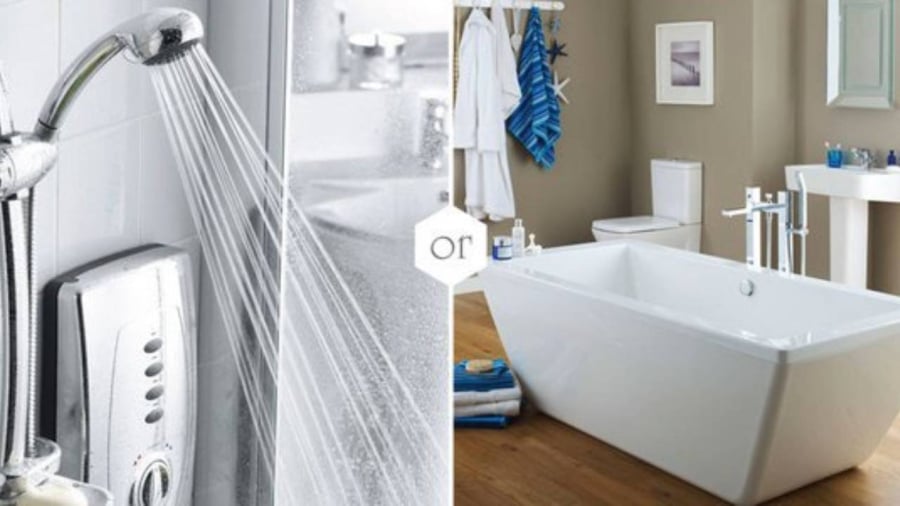There are pros and cons to both showering and taking a bath. The better option between the two depends on your specific circumstances, preferences, and needs.
Pros and Cons of Showering
– Low cost: Showers are generally more affordable to install and use less water, resulting in lower water bills. Their compact design also makes them suitable for bathrooms of all sizes.
– Time-saving: Showers offer more control over your time. If you’re in a hurry, you can simply adjust the water temperature and step under the shower without waiting.

– Accessibility: Showers are accessible to people of all ages and abilities, including the elderly and those with disabilities, unlike bathtubs that may pose challenges.
– Massage benefits: The water pressure from showers can stimulate acupuncture points and improve blood circulation. They are also excellent for facial massages, gently improving skin tone and reducing headaches caused by stress.
However, there are some drawbacks to consider:
– Manganese exposure: TS John Spangler of Wake Forest University (USA) warns of the potential risk of inhaling manganese released from shower water, which can affect both children and adults. Prolonged exposure to manganese in the brain may lead to central nervous system damage.
– Bacterial infection: The multiple small holes and layers of a showerhead create an ideal environment for bacteria to enter and proliferate, particularly pseudomonas aeruginosa and mycobacterium avium, which can cause chest infections and lung disease, respectively. Using the shower disperses these bacteria into the air, increasing the risk of inhalation.
Pros and Cons of Taking a Bath
– Ability to add beneficial ingredients: You can enhance your bath by adding Epsom salt to soothe pain, honey to reduce redness and irritation from eczema, sunburn, or your favorite essential oils for a more relaxing experience.
– Stress relief: Regular baths can effectively reduce stress, fatigue, and even depression. A 2018 study found that individuals who soaked in warm water daily experienced less fatigue, stress, and depression compared to those who only showered. Additionally, bathing increases blood flow and promotes detoxification through improved metabolism.
– Pain relief: Baths can also alleviate pain associated with hemorrhoids, help regulate body temperature, and exfoliate dead skin cells.
Some disadvantages of taking baths include:
– Time consumption: Filling the tub and waiting for the water to reach the desired temperature takes considerable time. Once you’re in, it’s easy to lose track of time and linger longer than intended.
– Water and energy consumption: Baths require a significant amount of water, especially if you prefer deep soaks. Using hot water also increases your energy consumption.
– High cost: Bathtubs occupy a considerable amount of space and tend to be more expensive to purchase and install, making them less accessible to those with smaller living quarters or tighter budgets.
– Limited accessibility: Individuals with mobility issues, including the elderly, may struggle to get in and out of the bathtub, making showers a more suitable option.
So, which is better, showering or bathing? Consider your unique circumstances, needs, and preferences when weighing the pros and cons of each option. Generally, if your priority is thorough cleansing, showers may be the way to go. On the other hand, if you’re seeking relief from chronic pain, wanting to unwind, or aiming to reduce stress and fatigue, baths might be the ideal choice.
If you have elderly family members or individuals with disabilities in your household, showers are likely the more practical and safer option.
Five Times You Should Avoid Bathing
1. On an Empty Stomach or Right After Eating:
After a meal, your body needs to direct blood flow to the digestive system. Bathing at this time can cause blood to circulate throughout the body as the blood vessels dilate and warm up, potentially interfering with digestion and leading to indigestion or discomfort.
Similarly, bathing on an empty stomach is not advisable as it may lower your blood sugar levels further. This can result in insufficient blood flow to the brain, causing dizziness or even fainting.
2. Immediately After Exercise:
Post-workout, your heart rate is elevated to supply oxygen to your muscles. If you bathe immediately afterward, the blood will circulate throughout your body, potentially leading to insufficient blood supply to your heart and brain. You may experience dizziness, nausea, fatigue, fainting, or even a stroke. Therefore, it’s essential to allow your body to rest and recover before bathing.
3. When You’re Exhausted:
When your body is exhausted, it may struggle to regulate its temperature, making you more susceptible to catching a cold, fainting, or even having a stroke. It’s best to rest and allow your body to regain its strength before bathing.
4. Right After Sun Exposure:
Although you may be tempted to bathe immediately after spending time in the sun to cool down and wash away the sweat, doing so can clog your pores. This can trap heat and cause your body temperature to drop, making you more prone to catching a cold.
5. At Night:
Bathing at night, especially with cold water, can cause your blood vessels to constrict. This reduced blood flow may lead to headaches and body aches. In more severe cases, it could even result in a stroke or other serious health issues.





































